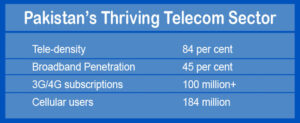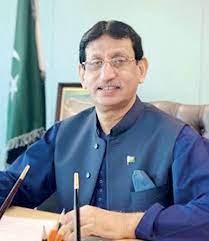The media often reports positive economic indicators such as $29+ billion in Foreign Exchange remittances, exports crossing $24 billion, higher tax revenues (Rs. 4.5+ billion) and substantial reduction in the current account and trade deficits, but it overlooks significant progress in the IT & Telecommunication sector, especially during the first global pandemic of the digital Internet age.
With 84 per cent teledensity and 45 per cent mobile broadband penetration, Pakistan has crossed 100 million 3G/4G subscriptions out of the total 184 million cellular users. Policies and interventions by the Ministry of IT & Telecommunications (MoITT) have resulted in substantial improvements in IT exports. They increased to $2.14 billion in FY 2020-21, 47.4 per cent more than the previous year. Planning to tap the fourth most lucrative freelancing market, the target for the current Financial Year has been set at $3.5 billion. Moreover, although the global lockdown affected Foreign Direct Investment (FDI) severely, the telecom sector rose to the occasion to make an iconic contribution of 25 per cent ($623 million) to the total FDI made in the country. Similarly, local telecom operators increased their investments by 14.25 per cent to reach $734 million in 2020. The Rs. 537 billion (FY 2020) telecom market led by the cellular operators, contributed Rs. 278 billion (including PTA deposits to the exchequer) in 2020 as compared to Rs. 121 billion in the previous year, registering YoY growth of 129 per cent.


This encouraging performance by the IT & Telecom sector is supported by multiple key policy interventions by the MOiTT that led the Finance Division to agree to provision Rs. 10 billion in lieu of IT industry support. Furthermore, a budget equal to 1 per cent of IT exports has been earmarked for marketing, branding and public image building of the IT industry of Pakistan. To address the concerns of the industry, a mechanism has been established for updating tax definitions and dispute resolution specific to the IT sector. Furthermore, collaboration is underway with the State Bank of Pakistan to resolve the long-standing apprehension of the industry about repatriation of profits/funds. To meet the funding requirements of the rapidly growing IT ecosystem, support is provided by MoITT for the listing of companies on the Pakistan Stock Exchange. Moreover, assistance is provided for compliance to GDPR regulations to improve the number of IT/ITeS exports.
Earlier, tax reforms were approved in the budget for revitalisation of the Telecom Sector, reducing the Withholding Tax from 12.5 per cent to 10 per cent (and later to 8 per cent), FED from 17 per cent to 16 per cent and minimum tax from 8 per cent to 3 per cent (under Section 153 3(b), with abolition of Rs. 250 per SIM Activation Tax). Additionally, the budget also included the long overdue implementation of Industrial Status for Telecom Operators.
It is promising to see the IT & Telecom Ministry delivering a few of the long deferred, much awaited policies of the sector. Publication of Pakistan’s First Right of Way Policy aims at encouraging access and digital connectivity while ensuring Ease-of- Doing telecom business. Similarly, the country’s first National Cyber Security Policy determines the national level Governance & Institutional framework for Cyber Governance in the country. Furthermore, the First Rolling Spectrum Strategy 2020-2023 was also published, providing a future roadmap for spectrum management / allocations and facilitating the industry for its network and investment planning.
In a country where $1.8 billion were spent on mobile phone imports last year, local manufacturing of smartphones is a pressing priority. The Ministry presented the recommendations and inspired approval of Pakistan’s First Mobile Device Manufacturing Policy, which has resulted in 26 authorisations to foreign and local companies for the production of mobile devices (2G/3G/4G) locally, including market leaders like Samsung, Vivo, Oppo, Realme and Nokia.
Spectrum is a valuable scarce resource but the benefit lies only in its effective use. Vacant and unassigned spectrum is of no commercial value for the country. The recently issued policy directives for the Next Generation Mobile Services (NGMS) Spectrum (1800 and 2100 bands) auction in Pakistan, Azad Kashmir and Gilgit Baltistan regions by the IT & Telecom Ministry shall hopefully give the right impetus to the Digital Pakistan efforts. It is appreciable to see that this shall be the first ever NGMS Spectrum Auction in the region of AJ&K and GB. Furthermore, license renewals of PTCL (at 0.66 per cent of the annual gross revenue) and cellular mobile operators in AJ&K and GB regions for $40.5 million without any complication is a healthy sign for the sector.

Inspired by the vision of the leadership, the IT & Telecom Ministry has also focused on development of IT & Telecom infrastructure in remote areas of the country. In less than two years, projects worth Rs. 25 billion have been signed for urgent execution in remote/rural areas in Pakistan, for provisioning of mobile broadband services and availability of optical fiber cable (OFC) deployment (4800 km OFC is being laid). Similarly, almost Rs. 50 billion are being spent on telecom infrastructure projects in Azad Kashmir and Gilgit Baltistan for improvement of broadband services, digital connectivity, promoting education and tourism.
MoITT has developed programmes to invest in upskilling of Pakistani youth, as more than 60 per cent of the Pakistani population is below the age of 30. More than 2 million digital skills trainings have been imparted through the Digiskills programme and an additional 3 million trainings is targeted. 20 training centres have been established under the National Freelance Training programme. To cater for the global demand for digital entrepreneurship, MoITT is working on establishing 6 National Incubation Centres across second tier cities, in addition to the already operational 5 National Incubation Centres in major cities of Pakistan. Moreover, 20 National Incubation Centres have also been funded, to be established through provincial IT authorities. In addition to the establishment of National Incubation Centres, 40 Software Technology Parks will be established across the country.

E-Government is rapidly transforming the way the government interacts with citizens and businesses. To provide transparency in government operations, electronic filing has been made available across 40 Divisions and 111 Departments of the federal government via e-office. Similarly, 40 government services are made available to the citizens of Islamabad through ICT city application. The Pakistan Citizens Portal has also been developed to address the grievances of citizens against public sector entities. Lastly, to fulfil the needs of rapid digital transformation of the government, work is in progress on establishment of a new Tier 4 Data Centre with the National Telecommunication Corporation. Considering the huge technology needs of Digital Pakistan, the government expenditure for MoITT has seen an increase of 44 per cent as compared to the previous financial year.
The Ministry has plans in place for the next two years. High on the radar are NGMS spectrum auctions in Pakistan, AJ&K and GB regions, Personal Data Protection Bill, Pakistan Cloud First Policy, Artificial Intelligence Policy, Telecom Broadband Policy, and Digital Pakistan Policy 2021, in addition to the much anticipated 5G Strategic Plan for the country.
In a nutshell, the IT & Telecom sector offers a huge opportunity for the sustainable economic growth of the country. The key is to offer a credible and consistent policy environment, address key sector issues, transform the mindset from the usual brick and mortar industry and sync our national strategy with the 4th Industrial Revolution to realize the dream of a Digital Pakistan.

The writer is the Federal Minister for IT and Telecommunication.

